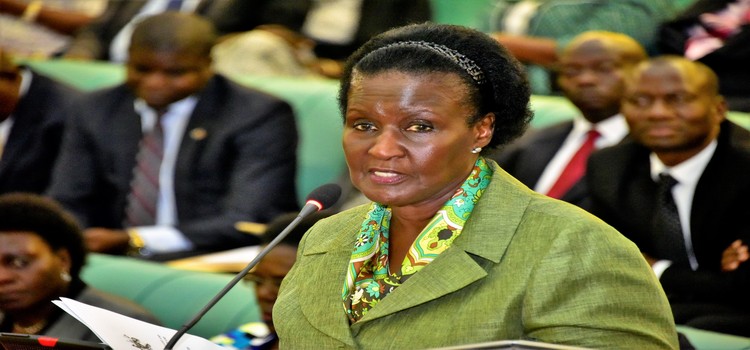
Trade Minister, Amelia Kyambadde making the statement on the maize prices
Farmers have rejected government minimum price of shs500 aimed at addressing the low prices currently on the market.
According to Mr. Patrick Kibira a local farmer in Ssembabule said that shs 500 is less compared to the amount of money and efforts they inject in to plant maize.
He says they have sacrificed a lot of resources putting in practice the presidential call that advocates for emphasis in farming but reaching frustration on the last point is not only unfair but discouraging.
This follows concerns raised by Members of Parliament over the falling maize prices in the country something that forced government to resolve on buying 500,000 metric tonnes of maize from farmers at a minimum price
In a joint statement to the House sitting on Tuesday,31 July, 2018, the Minister of Trade, Industry and Cooperatives, Hon. Amelia Kyambadde and the Minister of Agriculture, Animal Industry and Fisheries, Hon. Vincent Ssempijja said government will provide a budget through the Agriculture Credit Fund to the Grain Council to buy 500,000 metric tonnes of maize.
Ssempijja justified government’s decision saying that the Council buys 70 per cent of the maize while individuals buy 30 per cent.
He said the Grain Council has modern storage facilities across the country including dryers, sorters and cleaners.
“The Uganda Grain Council needs shs300 billion to evacuate 500,000 metric tonnes of maize and that is the money we are mobilising,” said Ssempijja.
“We have gone through the technical evaluation of producing maize and the highest cost of production is shs400,” Ssempijja explained.
Kyambadde said that a report will be presented to Parliament next week on the modalities of implementation of funding to the Grain Council.
She also listed other government interventions towards addressing the falling maize prices including; operationalisation of structured trading mechanisms, provision of standardised storage facilities at household, community and regional levels as well as implementation of the National Grain Trade Policy and its strategy.
The MPs however, opposed the plan to fund the Grain Council saying that the move is intended to enrich a few.
Hon. Paul Mwiru (FDC, Jinja East) said that the Grain Council is composed of companies which are within the warehouse receipt system and it is difficult for local farmers to join.
“For us to get money and channel it under the Grain Council, which already controls the sector, is not fair to the local farmers,” said Mwiru.


























